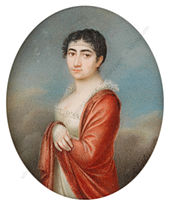Weling
The nobles von Weling were a Bavarian noble family of Jewish descent.
Family history
The family is of Jewish origin. Eduard Seligmann from Leimen in the Electoral Palatinate , nephew of the Bavarian court factor Aron Elias Seligmann (1747-1824), who was ennobled as Freiherr von Eichthal , married the daughter of his uncle (and his own cousin) Rebeka Caroline Seligmann in Munich in 1810 . The couple settled in Bamberg , where the husband worked as a banker and tobacco manufacturer. On December 12, 1814, the couple converted to the Catholic faith with their four children. The solemn ceremony took place in the Kunigunden Chapel of the Bamberg Cathedral of St. Peter and St. Georg; the children were baptized at home.
On December 17, 1816, Eduard Seligmann, his wife and all their descendants were accepted into the nobility of the Kingdom of Bavaria by King Maximilian I Joseph , as noble von Weling . Eduard Seligmann changed his name to Anton Eduard von Weling and his wife to Charlotte Edle von Weling .
In 1820 they bought Gut Cherbonhof near Gaustadt as their residence . The family moved to Munich around 1831. Rebeka Caroline Charlotte von Weling died in 1836, her husband went to Solothurn in Switzerland . According to the memories of the writer Alfred Hartmann , he lived there as a bon vivant .
The couple had three daughters and two sons.
The daughters Henriette and Auguste von Weling married the two brothers Andreas (* 1794) and Joseph von Großschedel (* 1800), siblings of the Bavarian major general Christian von Großschedel (1786-1856). A descendant from this line is u. a. the geologist Lukas Waagen (1877–1959).
The daughter Franziska von Weling (1816–1907) married Karl Joseph August Graf von Leyden zu Ainhoffen (1806–1876). Their child was the writer Charlotte Julia von Blennerhasset (1843–1917).
The son Maximilian was an Austrian officer and there are no known descendants of him. In 1850 he was named as a first lieutenant in the Bohemian hunter battalion Komotau .
Only the son Friedrich von Weling continued the family line. He married Auguste Glony, had the son Karl Andreas von Weling (1847–1915) with her, but died in 1849. His wife married Count Maximilian von Leublfing for the second time, who adopted the stepson Karl Andreas von Weling. With royal approval from July 20, 1872, he carried the title of Count of Leublfing for himself and his descendants , which made the noble family of Weling extinct.
Whether the hymn poet Anna Thekla von Weling , who was born in Neuwied in 1837 as the daughter of the Jewish-born officer Ferdinand Joseph von Weling († 1841), has anything to do with this noble family is unclear.
literature
- Heinrich Schnee : The court finance and the modern state: History and system of court factors at German royal courts in the age of absolutism. According to archival sources , Volume 5, Page 215, Duncker & Humblot, 1965; Excerpt from the source
- Walter Goetz and Georg Steinhausen : Archive for Cultural History , Böhlau Verlag, Volume 43, 1961, pages 90-92; Excerpts from the source
Web links
- Genealogical website about Anton Eduard Edler von Weling and his family
- Register entry on Eduard von Weling in the German biography
- Art website with detailed information on family history
- PDF document on the Cherbonhof in Gaustadt, with detailed information on the von Weling and Großschedel families
Individual evidence
- ^ Royal Bavarian Government Gazette, No. VII, of February 15, 1817; Scan from the source
- ^ Alfred Hartmann: Rückblicke , page 82, Solothurn Central Library, 2011, ISBN 3952313440 ; [1]
- ↑ Charlotte Julia von Blennerhasset in the New German Biography
- ↑ Military schematism of the Austrian Empire , Vienna 1850, page 332
- ↑ Website on noble Jewish families (see under No. 474)
- ^ Genealogical website on Count Karl Andreas von Leublfing and Weling

